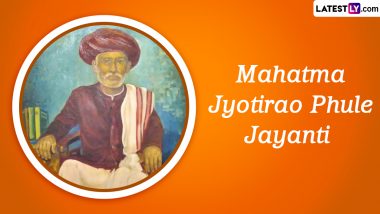Jyotirao Govindrao Phule, popularly known as Mahatma Jyotirao Phule, was a prominent Indian social activist, businessman, writer, and anti-caste social reformer. He dedicated his entire life to fighting against the caste system, advocating for the rights of lower castes and women, and working towards the eradication of untouchability. He was born on April 11, 1827, in Pune, Maharashtra, India. Jyotirao Phule's birth anniversary, also popularly celebrated as Jyotirao Phule Jayanti, is observed annually to honour his legacy and contribution to Indian society. India will celebrate Jyotiba Phule Jayanti 2024 on April 11, i.e., Thursday. On the occasion of Jyotirao Phule's 197th birth anniversary, let us deeply dive into the fascinating details of his life and the numerous accolades he received. Mahatma Jyotiba Phule Jayanti Date, History and Significance: All You Need To Know About the Great Indian Reformer on His Birth Anniversary.
1. Jyotirao Phule's father, Govindrao, was a farmer and flower vendor in Poona, now Pune. The Phule family was initially named Gorhe, and the men served as florists. They were skilled in growing and arranging flowers, which earned them a reputation. As a result, they adopted the name Phule, meaning flower-man, instead of Gorhe.
2. Jyotiba Phule and his followers established the Satyashodhak Samaj to secure equal rights for oppressed caste members.
3. He was given the title of "Mahatma" by a social worker, Vithalrao Krishnaji Vandeka, in 1888. Jyotirao Phule - Social and Anti-Caste Activist: Here we Remember Him on His Birth Anniversary.
4. Jyotiba Phule was inspired by Thomas Paine's book The Rights of Man and believed that education was the only solution to liberating and raising members of the lower castes and minorities.
5. Jyotirao Govindrao Phule, while assisting his wife Savitribai Phule, opened his first school for girls at Tatyasaheb Bhide's residence in Pune, also known as Bhidewada, in 1848.
6. Jyotirao Phule was deeply disturbed by the social evils that encouraged inequality, particularly the lack of education for women. To address this lack, he began by tutoring her wife, Savitribai Phule, every afternoon while she brought him his meal at the farm where he worked. Then, he sent her to a school to get formal training.
7. Mahatma Phule advocated for the remarriage of widows and established a home for pregnant widows of the dominant caste to give birth safely in 1863. He also established an orphanage to reduce the incidence of infanticides.
8. In 1977, the India Post released a commemorative stamp featuring Jyotiba Phule, a prominent activist and educator in India, as part of their "Personalities on Stamps" series.
9. Unfortunately, in 1888, Jyotirao Phule suffered a stroke that left him paralyzed. He passed away on November 20, 1890.
Jyotiba Phule is considered a significant personality in the social reform movement in Maharashtra. Phule's work profoundly impacted Dr BR Ambedkar, India's first Law Minister and the Chief Architect of the Indian constitution. His work continues to inspire many young Indians today, and he remains an important figure in Indian history.
(The above story first appeared on LatestLY on Apr 11, 2024 11:27 AM IST. For more news and updates on politics, world, sports, entertainment and lifestyle, log on to our website latestly.com).













 Quickly
Quickly





















